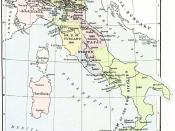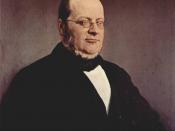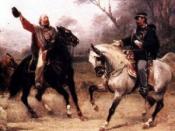The unification of Italy very much depended on the leadership of three important figures. The unification, eventually, was achieved through war and diplomatic alliances. This is due to the shrewd thinking of the Piedmontese prime minister, Camillo di Cavour, and the military achievements of, Giusseppe Garibaldi. However the political themes of the Risorgimento, which were independence, liberty and unification, was introduced in a trinity initiated by another leader, Giusseppe Mazzini.
Giussepe Mazzini was a man who possessed impressive rhetoric. However, his actions were not as remarkable and inspiring as his words. Mazzini's scheme and strategies were futile because it did not reach out to the masses of the population being the peasants and the urban "plebs". However through his continued though ineffective efforts, Mazzini inspired optimistic students and artisans. He aided in destabilizing the validity of Italian rulers and authenticating the process of unification. He made known to the people why a unified Italy is desirable in contemporary and practical terms.
By introducing the idea of the trinity, Mazzini showed that a unified Italy would provide freedom and democracy. His powerful language was a tool that thrust Italy towards unification. His form of leadership was the first stage to the unification as it was one where the idea of a unified Italy was implanted firmly into the people's mind.
However just having the idea of a unified Italy is insufficient. There must be an impetus that allows for this idea to be put into action. This impetus came in the form of Camillo di Cavour. Cavour's aims were restricted to Piedmont as he modernized it economically and tried to make it the centre of the unification. He realised that Italy could not "go it alone" as suggested by Mazzini. Therefore he used diplomatic tactics to achieve the goal.


